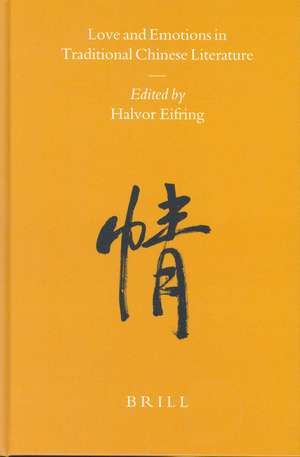Love and Emotions in Traditional Chinese Literature: Sinica Leidensia, cartea 63
Editat de Halvor Eifringen Limba Engleză Hardback – 20 noi 2003
Din seria Sinica Leidensia
- 18%
 Preț: 1037.13 lei
Preț: 1037.13 lei - 18%
 Preț: 902.42 lei
Preț: 902.42 lei - 18%
 Preț: 715.92 lei
Preț: 715.92 lei - 18%
 Preț: 633.41 lei
Preț: 633.41 lei - 18%
 Preț: 872.95 lei
Preț: 872.95 lei - 18%
 Preț: 622.48 lei
Preț: 622.48 lei - 18%
 Preț: 585.94 lei
Preț: 585.94 lei - 18%
 Preț: 868.30 lei
Preț: 868.30 lei - 18%
 Preț: 685.20 lei
Preț: 685.20 lei - 18%
 Preț: 1358.34 lei
Preț: 1358.34 lei - 18%
 Preț: 717.19 lei
Preț: 717.19 lei - 18%
 Preț: 725.15 lei
Preț: 725.15 lei - 18%
 Preț: 579.17 lei
Preț: 579.17 lei - 18%
 Preț: 596.61 lei
Preț: 596.61 lei - 18%
 Preț: 863.67 lei
Preț: 863.67 lei - 18%
 Preț: 1218.11 lei
Preț: 1218.11 lei - 18%
 Preț: 630.83 lei
Preț: 630.83 lei - 18%
 Preț: 777.23 lei
Preț: 777.23 lei - 18%
 Preț: 601.93 lei
Preț: 601.93 lei - 18%
 Preț: 636.85 lei
Preț: 636.85 lei - 28%
 Preț: 1692.18 lei
Preț: 1692.18 lei - 18%
 Preț: 729.06 lei
Preț: 729.06 lei - 18%
 Preț: 920.39 lei
Preț: 920.39 lei - 18%
 Preț: 1262.81 lei
Preț: 1262.81 lei - 18%
 Preț: 546.39 lei
Preț: 546.39 lei -
 Preț: 329.79 lei
Preț: 329.79 lei - 18%
 Preț: 821.91 lei
Preț: 821.91 lei - 18%
 Preț: 547.54 lei
Preț: 547.54 lei -
 Preț: 336.46 lei
Preț: 336.46 lei - 18%
 Preț: 691.88 lei
Preț: 691.88 lei - 18%
 Preț: 1061.30 lei
Preț: 1061.30 lei - 18%
 Preț: 731.38 lei
Preț: 731.38 lei - 18%
 Preț: 521.28 lei
Preț: 521.28 lei - 18%
 Preț: 823.06 lei
Preț: 823.06 lei - 18%
 Preț: 758.97 lei
Preț: 758.97 lei - 18%
 Preț: 610.42 lei
Preț: 610.42 lei - 18%
 Preț: 578.85 lei
Preț: 578.85 lei - 18%
 Preț: 763.68 lei
Preț: 763.68 lei - 15%
 Preț: 518.14 lei
Preț: 518.14 lei -
 Preț: 262.01 lei
Preț: 262.01 lei - 18%
 Preț: 937.17 lei
Preț: 937.17 lei - 18%
 Preț: 635.13 lei
Preț: 635.13 lei - 18%
 Preț: 585.70 lei
Preț: 585.70 lei - 15%
 Preț: 530.25 lei
Preț: 530.25 lei - 18%
 Preț: 659.85 lei
Preț: 659.85 lei - 15%
 Preț: 525.14 lei
Preț: 525.14 lei - 18%
 Preț: 579.32 lei
Preț: 579.32 lei - 15%
 Preț: 520.22 lei
Preț: 520.22 lei - 18%
 Preț: 536.26 lei
Preț: 536.26 lei - 18%
 Preț: 705.04 lei
Preț: 705.04 lei
Preț: 882.53 lei
Preț vechi: 1076.25 lei
-18% Nou
Puncte Express: 1324
Preț estimativ în valută:
168.92€ • 174.08$ • 142.61£
168.92€ • 174.08$ • 142.61£
Carte indisponibilă temporar
Doresc să fiu notificat când acest titlu va fi disponibil:
Se trimite...
Preluare comenzi: 021 569.72.76
Specificații
ISBN-13: 9789004137103
ISBN-10: 9004137106
Pagini: 344
Dimensiuni: 155 x 235 x 29 mm
Greutate: 0.76 kg
Editura: Brill
Colecția Brill
Seria Sinica Leidensia
ISBN-10: 9004137106
Pagini: 344
Dimensiuni: 155 x 235 x 29 mm
Greutate: 0.76 kg
Editura: Brill
Colecția Brill
Seria Sinica Leidensia
Public țintă
All those interested in pre-modern Chinese literature, intellectual history, and conceptual history, as well as those interested in historical, cultural and linguistic studies of emotion.Notă biografică
Halvor Eifring, Ph.D. (1993) in Chinese linguistics, University of Oslo, is Professor of Chinese at the University of Oslo. He has published on Chinese language and literature, as well as Norwegian slang and dialects. He is a meditation teacher in Acem School of Meditation and an editor of the Norwegian cultural magazine Dyade.
Recenzii
'These essays are all solidly researched and clearly written…the volume more than measures up to Eifring’s stated goal as “a first step towards a conceptual history of one of the key terms in traditional Chinese literature.”'
Paul S. Ropp, Nan Nü, 2005.
Paul S. Ropp, Nan Nü, 2005.
